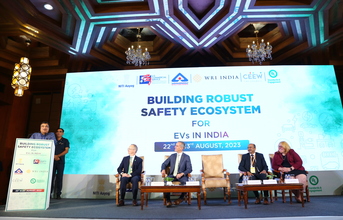
UL Standards & Engagement organised the two-day ‘Constructing a Resilient Electric Vehicle Safety Ecosystem in India' conference this week.
The event, in collaboration with the U.S. Commercial Service, Bureau of Indian Standards, WRI India, NITI Aayog, and the Council on Energy, Environment and Water (CEEW), put forward solutions to address safety concerns for the growing Electric Vehicles market in India.
Stakeholders proposed strategies for establishing a safer, more secure, and sustainable EV ecosystem in India. Discussion spewed on challenges faced by the country's EV sector, including adapting electric vehicles to tropical climates, and ensuring competence across the entire supply chain, from raw materials to maintenance. The importance of establishing a strong quality framework for EVs, building consumer confidence and the necessity for a skilled workforce was underscored during the two-day session.
Nitin Gadkari, Minister of Road Transport and Highways of India, stated, "The automotive industry is a vital contributor to our country's economy. With the increased adoption of electric vehicles in India, it's evident that we must take steps to support their development, including charging infrastructure and hydrogen filling stations, alongside greater investments in EVs."
Eric Garcetti, United States Ambassador to India added, "Amidst this transformative era, where climate concerns are significant, we are not merely engaged in engineering vehicles; we are dedicated to making people's lives better. Our commitment resonates in the expanding global electric car sector, where India emerges as a frontrunner, and the United States seeks a partnership to further this cause. I believe investment in innovations can help us take this ahead."
Sudhendu Sinha, Advisor - Infrastructure Connectivity - Transport & Electric Mobility, NITI Aayog, stated, "In our ongoing journey, it's crucial to identify safety gaps. Through establishing and enforcing standards, we guarantee consistent safety measures. With numerous Indian states aspiring to elevate manufacturing and mobility, we strive to foster an environment of innovation and progress."
Madhav Pai, CEO, WRI India, added, "The Open Battery Management System platform initiated by NITI Aayog, and supported by WRI India, has brought together more than 50 academic institutions and industry leaders to develop basic BMS stack for both software and hardware components which ensures that two-wheeler and three-wheeler EVs are safe."
Rishabh Jain, Senior Programmes Lead CEEW, stated "Multiple stakeholders, including government departments - at the national and sub-national level - vehicle and battery manufacturers, labs and academic institutions, need to come together. Only through a regular consultative process between the industry and government, India will be able to make the EVs safer and accelerate the process of decarbonisation of its transport sector."


























